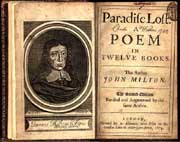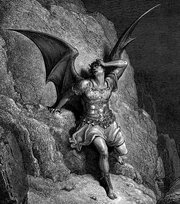MILTON'S BELIEFS
and Paradise Lost

MILTON'S BELIEFS
and Paradise Lost

Milton had finished Paradise Lost in the 1660's, and it was published in 1667. Recall what historical event had occurred in 1660. It went through several editions, including the addition of the prose Argument ("Plot" summaries before each book of poetry). There are references (called topical--relating to a topic) throughout PL to the restoration which, of course he detested:
...as when the sun new risen
Looks through the horizontal misty air
Shorn of his beams, or from behind the moon
In dim eclipse disastrous twilight sheds
On half the nations, and with fear of change
Perplexes monarchs.
(I,ii, 595 ff.)
PL is written in form of a classical epic, for which you have a separate handout explaining its characteristics. Issues include Satan's rebellion and fall, creation of man, Satan's deception of Adam, and the promise of the redemption. Milton almost allows Satan to acquire a tragic dimension. What is topical about that?
THEOLOGY:
Milton wrote a long prose work in Latin called On Christian Doctrine: [CLICK HERE to access the works of Milton on line.] Being classically educated and relying on logic as means of understanding religious dogma along with the Bible and revelation, he argued some views--also reflected in PL--that were heretical in the conventional senses, such as:
1. Jesus created by God and not co-eternal ("...for a real son is not the same age as his father...God violated his own essence by begetting and equal")
2. God did not create out of nothing ("...a thing cannot be put together from nothing...something must have existed previously so it could be acted upon...")
Milton's view on predestination is most important for PL. His fundamental belief is in accepting free will of God, Satan and man as absolute. He says: "God before the foundation of the world had mercy on the human race, although it was going to fall of its own accord...[God] predestined to eternal salvation, according to his purpose in Christ those who would believe and continue in the faith." Milton argued that it would be useless to speculate about an individual man in this regard. This issue is also examined in PL.
SPECIFICS OF THE BELIEF:
Nature: "Nature cannot mean anything but the mysterious power and efficiency of the divine voice which went forth in the beginning, and to which, as to a perpetual command, all things have since paid obedience. The law of God is either written or unwritten, The unwritten law is no older than the law of nature given originally to Adam, and of which a certain remnant or imperfect illumination still dwells in the hearts of all mankind." This law he believes is kept alive by the holy spirit."
This law is very personal for Milton and he believes that it even could transcend biblical knowledge in terms of understanding God's will. Milton said: "We possess a two-fold Scripture--one external which is the written word, and the other internal which is the Holy Spirit, written in the hearts of believers...that which is internal and the particular possession of each believer, is far superior to all. The external Scripture or written word, particularly of the New Testament, has been liable to frequent corruption, but the Spirit which leads to truth cannot be corrupted."
Does Milton doing this allow him to advance a personal thesis? See opening of PL.
Bible Milton did not of course reject the Bible as a supreme way to understand the truth of God. He needed to rely on some authority in an age when traditional values were under fire.
PROBLEMS WITH MILTON'S BELIEFS:
Milton tends to use scripture to suit his own purposes. Recall the problems of reliable epistemology in terms of the relationship between mind and matter, and what truth could be known for certain.
1. Literal belief is the same as a concrete fact--Dr. Nighan is a genius. No one could doubt that fact. One could use the "scientific" method and confirm it.
2. Poetic belief is more complicated, and involves the use of metaphor (conceits) in terms of making comparisons that everyone might not accept. Dr. Nighan is like Aristotle in his brilliance. No, you argue, he is more like Plato.
Remember that in the 17th century, 1 and 2 above tended to blend--that is, the mixing of the scientific or literal with the transcending aspect of the poetic. Is the creation story, for example, a metaphor or a literal fact?
Milton does not always believe that Bible History must be taken literally, although at times he does--(paradox). He says: "It is out of the rind of one apple tested, that the knowledge of good and evil, as two twins cleaving together, leaped forth into the world. And perhaps that is the doom which Adam fell into of knowing good and evil; that is to say of knowing good by evil. Anyone who examines this sin carefully will admit, and rightly, that it was a most atrocious offense, and that it broke every part of the law...He was to be condemned for trusting Satan and not for trusting God, he was faithless, ungrateful, disobedient, greedy...she negligent of her husband' selfish both of them committed theft...each was sacrilegious and deceitful, cunning aspiring to divinity..."
Milton accepts therefore: 1. The fall of man is accepted as a spiritual given and Milton must accept it, but he does have problems with man's free will: "For if God rules all human actions by his absolute command, then he is not doing anything more than he is entitled to do, and no one need complain. But if he turns man's will to moral good or evil just as he likes, and then rewards the good and punishes the wicked, it will cause an outcry against divine justice from all sides. If religious matters were not under our control, or to some extent within our power and choice, God could not enter a covenant with us, and we could not keep it, let alone swear to keep it."
Man is therefore free to cooperate with the divine plan; if he does the "fall" is fortunate!!!
Why?...
MILTON'S LITERARY BELIEFS:
"These abilities of the poet are the inspired gift of God rarely bestowed, but yet to some (though most abuse) in every nation and are of power, beside the office of a pulpit to inbreed and cherish in a great people the seeds of virtue, and public civility, to all the perturbations of the mind, and set the affections in right tune,...to celebrate God's almighty power...to deplore the general relapses of kingdoms and states from justice and God's true worship...Teaching the whole book of sanctity and virtue through all the instances of example, with such delight to those especially of soft and delicious temper who will not so much as look upon Truth unless they see her elegantly dressed that whereas the paths of honesty and good life appear not rugged and difficult, though they be indeed easy and pleasant though they were difficult indeed."
QUESTION: who influenced Milton's beliefs?
On the role of the poet:
"...devout prayer to that eternal spirit who can enrich with all utterances and knowledge, and sense out his angels with the hallowed fire of his alter to touch and purify the lips of whom he pleases. To this must be added industrious and select reading, steady observations, insight into all seemingly and generous arts and affairs."
RENAISSANCE IDEAS:
1..chain of being
2..earth as center of universe
3..macro/micro correspondences
PARADISE LOST AS EPIC
You may recall from our study of Homer, Beowulf (or viewing Star Wars for that matter) that the epic is one of the oldest genres. People love to tell adventure stories of heroes doing brave deeds from Achilles to Luke Skywalker. As Joseph Campbell observed, the hero has a thousand faces, so Odysseus, Beowulf, Milton's Satan and Captain Kirk all do the same things. Homer is credited with having composed the first epic poems orally, and the "Homeric question" debates whether he was an actual person who wrote theme down, or whether the tales existed in oral tradition, and we give the name "Homer" to someone who inherited the tradition and formulated it. Critics such as Milman Parry, JRR Tolkien, Carl Jung and Joseph Campbell have debated the issue. Epics are either folk epics like Beowulf or literary epics like Paradise Lost. Beowulf exists as part of an oral tradition, and literary epics use the classical epic conventions, but have a specific author.
For Paradise Lost, be able to define the following archetypes (conventions). Referencing other works may help:
RESOURCES:
YOUR TEXTBOOK
STUDENT CURRICULUM LINKS: LITERARY DICTIONARIES
CHARACTERISTIC:
JOURNEY:
HEROIC FIGURE:
CRISIS:
FATE OF THE NATION:
IN MEDIAS RES:
ARMING OF HERO:
LOFTY STYLE:
DESCENT TO UNDERWORLD:
EPIC SIMILE:
INVOCATION TO MUSE:
EPIC QUESTION:
SET SPEECHES:
MOTIFS:
PERSONIFICATION:
DEUS EX MACHINA:
MILITARY VALUES:
ROLE OF WOMEN:
ORAL TRADITION:
REPETITIVE:
VAST SETTING:
ALLUSIONS:

Discussion Questions for Book I:
1. Of note is the character of Satan, one of the most dynamic in literature. How do you think Milton intended him to appear? Note the above relationship between the metaphoric and the literal.
2. Examine very carefully the epic similes used to create Satan. By locating their references points on a map of Europe, what image emerges and what might Milton be implying?
Discussion Questions for Book IV (Satan's opening Soliloquy):
{Recall in explicating this passage that it follows the series of
epic similes that are used in Book I to define Satan's "size".
How is 'size' important then and now?}
1. What is Satan's chief regret?
2. What is the epic simile introduces the passage?
3. Whom or what do the opening lines address? Why?
4. The 'sun' lines suggest what macrocosmic / microcosmic correspondence?
5. Why does Satan hate the sun?
6. What is rather unexpected about the line beginning , "Till pride..?" What does the line suggest from an epistemological and moral perspective?
7. What does Satan mean when he says heaven's king is matchless?
8. What does "Ah wherefore?" mean?
9. How does Satan feel about God?
10. What does "how due" mean?
11. "One step higher / Would set me highest..." implies what admission?
12. How did Satan misunderstand gratitude?
13. What is the answer to the rhetorical question, "What burden then?"
14. Why did Satan wish to be an inferior angel?
15. What belief of Milton is contained in this passage, a belief that he regarded as absolute?
16. What conclusion does Satan reach regarding his relationship to God?
17. Notice that the consciousness of Satan is fluid--stream of consciousness. Milton charts the ebbing and flowing of a great mind in torment. What is the nature of his vacillation from a moral perspective?
18. What is so horrible about hell to Satan?
19. What does 'submission' mean connotatively? 'disdain?'
20. Of what is Satan especially concerned and ashamed?
21. How does Milton use irony to create the portrait? As you read, is your impression of Satan what you expected?
Discussion Questions for Book IX (the Temptation Scene)
1. Notice the tactics that Satan uses to 'trick Eve'--what had he noticed about her earlier in the poem?
2. What epic simile prefaces his remarks. Note the allusion to an oration. Why?
3. Certainly Milton was no feminist (recall his biography). How does that influence the 'seduction' of Eve?
4. Look at Satan philosophy by studying his epistemology. What we have said about Locke and Descartes would help with the explication. Note too a Macbeth parallel and a theme in that play alluding to the gunpowder plot and subsequent trial.